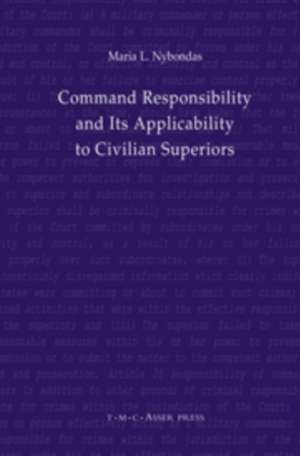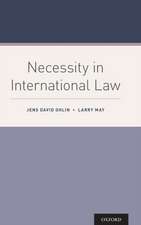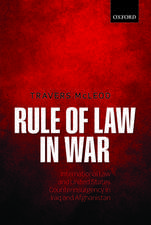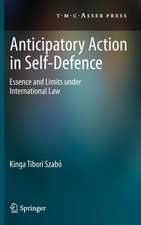Command Responsibility and Its Applicability to Civilian Superiors
Autor Maria L. Nybondasen Limba Engleză Hardback – 29 iun 2010
Article 28 of the Rome Statute explicitly provides that the command responsibility doctrine may be applied to both ‘commanders and other superiors', and sets out separate criteria for the two categories of superiors. The question arises how the doctrine should be applied by the International Criminal Court and by other international courts and tribunals. Up until now, the doctrine has been applied to both military and civilian superiors without a distinctive provision.
The author examines the applicability of the command responsibility doctrine to civilian superiors, taking as a point of departure the origin of the doctrine and the unique position of the commander. An analysis of cases against civilian leaders identifies the challenges that prosecutors and judges face in these cases. The author provides, finally, an assessment of the remaining hurdles in the application of the doctrine, and offers a solution which is based on respect for the purpose of the doctrine.
The book is a valuable source and tool for academics and practitioners in international criminal law and international humanitarian law, academics and students at National Defence Colleges, as well as military legal advisers and higher military officers.
Maria L. Nybondas is an Associate Researcher at the T.M.C. Asser Instituut, The Hague, The Netherlands.
Preț: 394.51 lei
Nou
Puncte Express: 592
Preț estimativ în valută:
75.49€ • 80.72$ • 62.94£
75.49€ • 80.72$ • 62.94£
Carte tipărită la comandă
Livrare economică 17 aprilie-01 mai
Preluare comenzi: 021 569.72.76
Specificații
ISBN-13: 9789067043274
ISBN-10: 9067043273
Pagini: 260
Ilustrații: 256 p.
Greutate: 0.57 kg
Ediția:1st Edition.
Editura: T.M.C. Asser Press
Colecția T.M.C. Asser Press
Locul publicării:The Hague, Germany
ISBN-10: 9067043273
Pagini: 260
Ilustrații: 256 p.
Greutate: 0.57 kg
Ediția:1st Edition.
Editura: T.M.C. Asser Press
Colecția T.M.C. Asser Press
Locul publicării:The Hague, Germany
Public țintă
ResearchDescriere
Article 28 of the Rome Statute explicitly provides that the command responsibility doctrine may be applied to both 'commanders and other superiors', and sets out separate criteria for the two categories of superiors. The question arises how the doctrine should be applied by the ICC and by other international courts and tribunals. Up until now, the doctrine has been applied to both military and civilian superiors without a distinctive provision. Maria L. Nybondas examines the applicability of the command responsibility doctrine to civilian superiors, taking as a point of departure the origin of the doctrine and the unique position of the commander. An analysis of cases against civilian leaders identifies the challenges that prosecutors and judges face in these cases. The book provides an assessment of the hurdles in the application of the doctrine, and offers a solution which is based on respect for the purpose of the doctrine.
Cuprins
The Legal Basis for Command Responsibility.- Command Responsibility in Armed Conflict.- Applying command responsibility to civilian superiors.- Remaining hurdles in the application of the command responsibility doctrine.- Synthesis — Justified differentiation between military and civilian superiors?.
Textul de pe ultima copertă
Article 28 of the Rome Statute explicitly provides that the command responsibility doctrine may be applied to both ‘commanders and other superiors', and sets out separate criteria for the two categories of superiors. The question arises how the doctrine should be applied by the International Criminal Court and by other international courts and tribunals. Up until now, the doctrine has been applied to both military and civilian superiors without a distinctive provision.
The author examines the applicability of the command responsibility doctrine to civilian superiors, taking as a point of departure the origin of the doctrine and the unique position of the commander. An analysis of cases against civilian leaders identifies the challenges that prosecutors and judges face in these cases. The author provides, finally, an assessment of the remaining hurdles in the application of the doctrine, and offers a solution which is based on respect for the purpose of the doctrine.
The book is a valuable source and tool for academics and practitioners in international criminal law and international humanitarian law, academics and students at National Defence Colleges, as well as military legal advisers and higher military officers.
Maria L. Nybondas is an Associate Researcher at the T.M.C. Asser Instituut, The Hague, The Netherlands.
Notă biografică
Maria L. Nybondas is an Associate Researcher at T.M.C. Asser Instituut, The Hague.




















